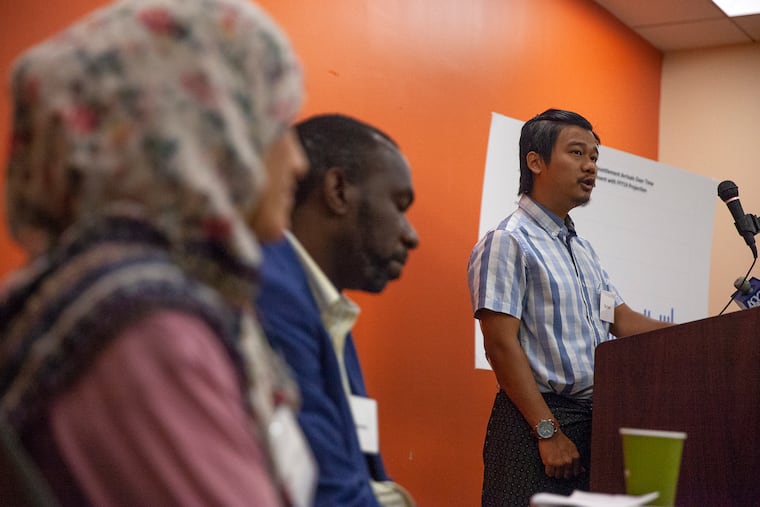Philly agencies plead for greater admissions of refugees, as deadline nears for new cap
The world faces its worst refugee crisis since World War II, with an estimated 25.4 million people currently forced from their homelands.

Leaders of the three Philadelphia-area agencies that work to resettle refugees issued a dire plea for help Thursday.
Not for themselves, but for the millions of people living overseas in often squalid camps, who look to the United States as a beacon of hope and opportunity. And, they said, for a nation that has long refueled itself through the continuing influx of immigrant expertise, energy and enterprise.
"Refugees are assets," said Cathryn Miller-Wilson, executive director of HIAS PA. "They are investments in our economy. And in our global security."
She spoke at an emotional Center City panel discussion on the endangered federal refugee program, as the Trump administration considers whether to essentially end the country's role as a haven for people fleeing war, genocide, persecution or natural disaster.
Deadlines are close. By law, the president must set an annual cap on refugee admissions before the new fiscal year starts Oct. 1.
President Trump set the current cap at 45,000, a nearly four-decade low, and less than half the 110,000 set by President Obama in 2016. Only about half of those 45,000 actually will be admitted by the time the fiscal year ends Sept. 30.
Word from Washington, say resettlement agency officials, is that Trump might drop the cap to 25,000, with perhaps only half of that number entering the country, due to bureaucratic slow-downs.
>>READ MORE: After fleeing war in Syria, she's in Philly, speaking out for refugees
Immigration advocates here and elsewhere want the administration to set a cap of 75,000, which has been roughly the annual average since the program was created in 1980 by the U.S. Refugee Act. They are urging people to contact their elected representatives, and to join a social-media campaign under the hashtag #Welcome75k.
Refugees differ from some other classifications of migrants in that they hold a specific legal status. If chosen for resettlement in the U.S., they undergo extensive security checks, then must apply for permanent-resident status a year after being admitted.
On Thursday, about 50 people gathered at the Arch Street offices of Nationalities Service Center, which with HIAS PA and Bethany Christian Services has resettled more than 2,000 refugees in the region during the past four years.
Retired neuropsychologist and HIAS PA volunteer Dr. David Glosser asked the crowd: Is anyone in the room an indigenous person?
Not one hand went up.
That means, he said, that your people came here from somewhere else, voluntarily or involuntarily. His did, too — fleeing violent anti-Jewish pograms in the village of Antopol, located in what is now Belarus, and reaching Ellis Island in 1903.
His family history has become well-known because of Glosser's widely read Politico essay in which he excoriated his nephew, White House immigration hard-liner Stephen Miller, as a hypocrite.
>>READ MORE: Immigrant advocates fear U.S. will no longer be a beacon for refugees
There's no hope of persuading Trump administration officials to change their minds on immigration, because "they don't give a damn what you say" in terms of logic or morality, said Glosser, who lives in the Philadelphia area.
"Any tyrant can make any laws, and declare the oppressed group to be violators of those laws," he said. "What they're trying to do is reduce the proportion of people in the U.S. who are not white."
The only option for change, he said, is for people to exercise their political rights: Vote. Donate. Volunteer.
Former refugees from Myanmar, Zaire and Syria told how admission to the U.S. saved their families.
Sozi Pedro Tulante, the former Philadelphia city solicitor who now teaches at the University of Pennsylvania Law School, explained how his father took part in an attempt to overthrow the government in Zaire, now the Democratic Republic of Congo. After that, his life was in danger.
Under President Reagan, hardly a left-leaning liberal, his family was able to come to Philadelphia as political refugees in 1983. In this country, Tulante said, his father drove a cab — and proudly wore a Harvard University cap after his son was admitted.
"Refugees are often seen as 'the other,'" Tulante said. "These are real people. … It may seem like numbers, but those are real people with real lives."
Today, the world is facing its worst refugee crisis since World War II, with an estimated 25.4 million people currently forced from their homelands, according to the United Nations.
At the same time, doors to the U.S. have closed. President Trump and his administration maintain that the nation has lost control of its borders, and have worked to reduce virtually every form of immigration, including admissions of refugees.
"The program is on life-support," said Margaret O'Sullivan, executive director of Nationalities Service Center. "A program that has served as a point of pride for our nation for 40 years."